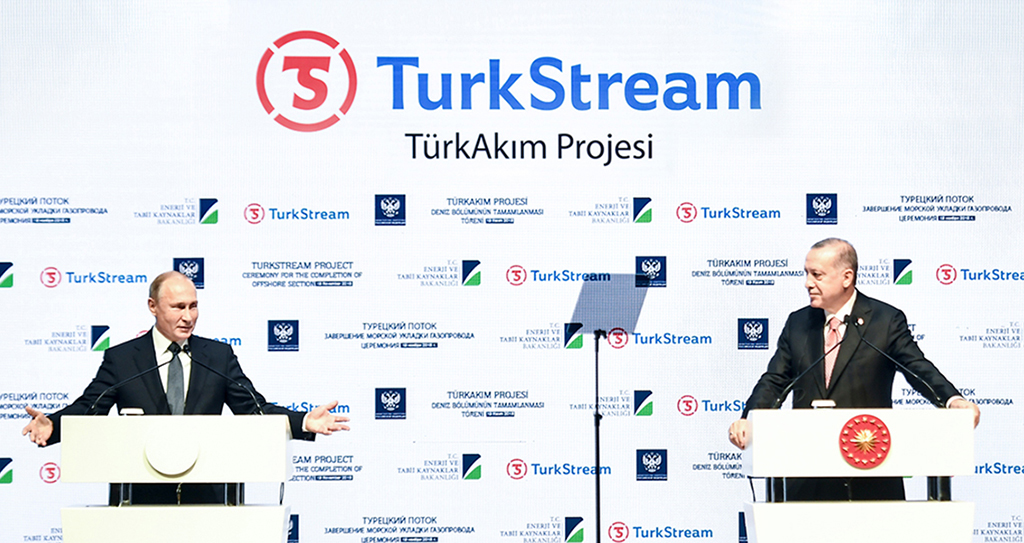A Vortex Of Conflict the Evolving Dynamics of Turkey’s Involvement in Libya
The analysis discusses the evolving dynamics of Turkey’s military involvement in Libya, laying out Turkey’s motivations for supporting the UN-recognized government in Tripoli, and examining how Turkey’s recent military achievements on the ground may leverage its hand diplomatically to secure a political settlement that protects its interests in Libya and in the Eastern Mediterranean.
More


Looking at the Tovuz clashes from an energy perspective
he latest clashes between Azerbaijan and Armenia in the Tovuz region on July 12 rather than drawing attention to the historic hostilities between the two nations underlined the area's geopolitical importance. The strategic location of this region as a crucial energy trade hub constitutes the main reason for such attention.
More
Turkey and Greece have been in conflict for the last several decades. However, mainly due to a series of anti-Turkish moves made by the Greek state and the transgressed explanations made by Greek officials, tensions between the two countries have risen dramatically in recent years. As a reaction to Turkey’s improvement of its defense industry and its effective interventions in regional crises, Greece has been trying to exploit every opportunity to produce anti-Turkish policies.
The Gülenist Terror Group's (FETÖ) July 15 coup attempt in 2016 was one of the darkest moments in Turkish political history. It was a traumatic event for the Turkish bureaucracy and military.
Fayez al-Sarraj, Libya’s prime minister, visited the Turkish capital on Thursday to hold talks with President Recep Tayyip Erdoğan. Unlike in the past, his hosts in Ankara welcomed a joyous Libyan leader, celebrating the liberation of Tripoli, including its international airport.
The main focus of the politicians, academicians, researchers and intellectuals in the United States has been China for the last several decades as Americans believe China has the biggest potential to challenge the American hegemony. Publishing houses have been publishing books and academic journals have been covering research articles about China, a country that widely remains a mystery for most Americans; therefore, they closely follow developments about China to track not only political, military and economic developments but also its scientific and technological potential. In other words, there has been an increasing polarization between the U.S. and China, which has further accelerated during the coronavirus pandemic.
COVID-19's blow to energy markets
Fall in oil prices harbinger of dark days for countries whose economies depend on energy exports
More


Change of balance in Libya
That mankind will draw lessons from the COVID-19 pandemic is just wishful thinking. The virus outbreak cannot seem to end violence or the struggle for power. The situation in Libya supports this claim.
More
The analysis provides an overview of the two central security challenges Greece faces today, namely the energy rivalry with Turkey in the Eastern Mediterranean/Libya, and the mass influx of refugees at the Greek-Turkish border, and discusses the prospects for a renewed Greek-Turkish détente.
International focus has been on the Middle East for decades and particularly on Iran, Syria, Egypt, Iraq and Libya over the past several years. However, whatever is written about the Middle East, Russia is always part of the equation.
The analysis provides an overview of the Greek security policy in the Eastern Mediterranean since the failure of the latest round of Cyprus peace talks in July 2017 and highlights the continuity in the strategies employed by Greece to head off the perceived Turkish threat in the region.
Turkey's objectives amid the recent tensions in Idlib are clear and the scope of a possible military operation would be limited..
It is true President Recep Tayyip Erdoğan and Russian President Vladimir Putin have had an amenable relationship. Turkey and Russia are also both regional actors that share partnerships on many issues. The recent cooperation between the two countries is not as black and white as foreign affairs and alliances between countries were during the Cold War. To call this period of cooperation a "honeymoon," however, would be incorrect.
Even though the Syrian crisis continues to influence politics in the Middle East and the global balance, the European Union and major European powers, like the U.K., Germany and France, have continued to be the most reluctant and ineffective actors dealing with the crisis.
TurkStream substantially contributes to bringing to the foreground an aspect of energy sources that strengthens cooperation and provides economic benefit rather than conflict.
With Hungary, Bulgaria and Serbia to depend on TurkStream, Turkey’s importance to increase in terms of energy security
The fall of Tripoli could undermine European energy security and unleash a new refugee wave on already overwhelmed countries
Turkey 'has pushed back' any challenge in region to itself or Northern Cyprus through Libya deal, says analyst
A new alliance is forming in the Eastern Mediterranean Region aiming to strike against Turkey's rising influence and naval power in the region. Economic arguments are being used to form a political alliance against Turkey.
NATO, a 70-year-old military alliance, faces new strategic questions. The challenges that the organization encounters are diverse. Russian cyber-meddling in Western democracies, China's move to buy European infrastructure, Washington's reckless effort to undermine the liberal order, the rise of populism in Europe, terrorism and the refugee crisis are among them. At the same time, there is the question of "what kind of ally" Turkey is.
Israel's occupation of Palestine and constant attacks to the unarmed civilians prove the harm the country causes to the World peace, President Recep Tayyip Erdoğan said

















